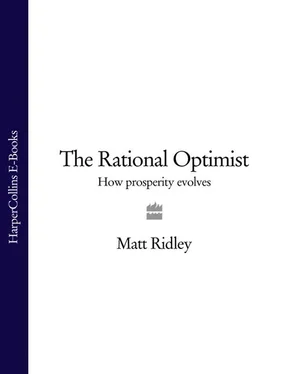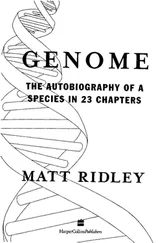Moreover, finding the underlying physiology of trust does little to explain why some human societies are much better at generating trust than others. As a broad generalisation, the more people trust each other in a society, the more prosperous that society is, and trust growth seems to precede income growth. This can be measured by a combination of questionnaires and experiments – leaving a wallet on the street and seeing if it is returned, for instance. Or asking people, in their native tongue, ‘generally speaking, would you say that most people can be trusted, or that you cannot be too careful in dealing with people?’ By these measures, Norway is heaving with trust (65 per cent trust each other) and wealthy, while Peru is wallowing in mistrust (5 per cent trust each other) and poor. ‘A 15% increase in the proportion of people in a country who think others are trustworthy,’ says Paul Zak, ‘raises income per person by 1% per year for every year thereafter.’ This is most unlikely to be because Norwegians have more oxytocin receptors in their brains than Peruvians, but it does suggest that Norwegian society is better designed to elicit the trust systems than Peruvian.
It is not at all clear what comes first: the trust instinct or trade. It is most unlikely that the oxytocin system fortuitously mutated into a sensitive form, which then enabled human beings to develop trading. Much more plausibly, human beings began tentatively to trade, capturing the benefits of comparative advantage and collective brains, which in turn encouraged natural selection to favour mutant forms of the human mind that were especially capable of trust and empathy – and even then to do so cautiously and suspiciously. I shall be amazed if the genetics of the oxytocin system do not show evidence of having changed rapidly and recently in response to the invention of trade, by gene-culture co-evolution.
A trillion generations of unbroken parental generosity stand behind a bargain with your mother. A hundred good experiences stand behind your reliance on a friend. The long shadow of the future hangs over any transaction with your local shopkeeper. He surely knows that in making a quick buck now by ripping you off he risks losing all future purchases you might make. What is miraculous is that in modern society you can trust and be trusted by a shopkeeper you do not know. Almost invisible, the guarantors of trust lurk beneath every modern market transaction: the sealed packaging, the warranty, the customer feedback form, the consumer legislation, the brand itself, the credit card, the ‘promise to pay the bearer’ on the money. When I go into a well-known supermarket and pick up a tube of toothpaste of a well-known brand, I do not need to open the package and squirt a little toothpaste on to my finger to test that the tube is not filled with water; I do not even need to know that the shop is subject to laws that would prosecute it for selling false goods. I just need to know that this big retailing company, and the big company that made the toothpaste, are both keen to keep me coming back year after year, that the shadow of reputational risk hangs over this simple transaction, ensuring that I can trust this toothpaste seller without a moment’s thought.
There is a vast history behind the trustworthiness of a tube of toothpaste, a long path of building trust inch by inch. Once that path is trodden, though, trust can be borrowed for new products and new media with surprising ease. The remarkable thing about the early days of the internet was not how hard it proved to enable people to trust each other in the anonymous reaches of the ether, but how easy. All it took was for eBay to solicit feedback from customers after each transaction and post the comments of buyers about the sellers. Suddenly every deal lay under the shadow of the future; suddenly, every eBay user felt the hot breath of reputation on his neck as surely as a Stone Age reindeer hide salesman returning to a trading place after selling a rotten hide the year before. When Pierre Omidyar founded eBay, few believed as he did that trust between anonymous strangers would prove easy to create in the new medium. But by 2001, fewer than 0.01 per cent of all transactions on the site were fraud attempts. John Clippinger draws an optimistic conclusion: ‘The success of trust-based peer organizations such as eBay, Wikipedia, and the open-source movement, indicates that trust is a highly expandable network property.’ Perhaps the internet has returned us to a world a bit like the Stone Age in which there is no place for a fraudster to hide.
That response would be naïve. There is plenty of innovative and destructive cyber-crime to come. None the less, the internet is a place where the problem of trust between strangers is solved daily. Viruses can be avoided, spam filters can work, Nigerian emails that con people into divulging their bank account details can be marginalised, and as for the question of trust between buyer and seller, companies like eBay have enabled their customers to police each other’s reputations by the simple practice of feedback. The internet, in other words, may be the best forum for crime, but it is also the best forum for free and fair exchange the world has ever seen.
My point is simply this: with frequent setbacks, trust has gradually and progressively grown, spread and deepened during human history, because of exchange. Exchange breeds trust as much as vice versa. You may think you are living in a suspicious and dishonest world, but you are actually the beneficiary of immense draughts of trust. Without that trust the swapping of fractions of labour that goes to make people richer could not happen. Trust matters, said J.P. Morgan to a congressional hearing in 1912, ‘before money or anything else. Money cannot buy it…because a man I do not trust could not get money from me on all the bonds in Christendom.’ Google’s code of conduct echoes Morgan: ‘Trust is the foundation upon which our success and prosperity rest, and it must be re-earned every day, in every way, by every one of us.’ (And, yes, one day people will probably look back on Google’s founders as robber barons, too.) If people trust each other well, then mutual service can evolve with low transactional friction; if they do not, then prosperity will seep away. That is, of course, a large part of the story of the banking crisis of 2008. Banks found themselves holding bits of paper that told lies – that said they were worth far more than they were. Transactions collapsed.
If trust makes markets work, can markets generate trust?
A successful transaction between two people – a sale and purchase – should benefit both. If it benefits one and not the other, it is exploitation, and it does nothing to raise the standard of living. The history of human prosperity, as Robert Wright has argued, lies in the repeated discovery of non-zero-sum bargains that benefit both sides. Like Portia’s mercy in The Merchant of Venice , exchange is ‘twice blest: it blesseth him that gives and him that takes.’ That’s the Indian rope trick by which the world gets rich. Yet it takes only a few sidelong glances at your fellow human beings to realise that remarkably few people think this way. Zero-sum thinking dominates the popular discourse, whether in debates about trade or in complaints about service providers. You just don’t hear people coming out of shops saying, ‘I got a great bargain, but don’t worry, I paid enough to be sure that the shopkeeper feeds his family, too.’ Michael Shermer thinks that is because most of the Stone Age transactions rarely benefited both sides: ‘during our evolutionary tenure, we lived in a zero-sum (win-lose world), in which one person’s gain meant another person’s loss’.
Читать дальше












